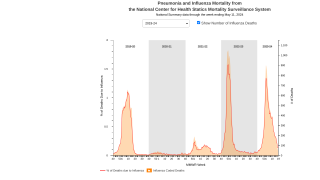Hospitalized Patients Need Flu Shots Too

According to a new Kaiser Permanente study, giving patients an influenza vaccine while they are hospitalized is convenient and most important, safe.
This Kaiser study reported:
- 74 percent of those who miss the opportunity to vaccinate before or during hospitalization, remained unvaccinated throughout the flu season,
- 71 percent of patients vaccinated during their hospital stay were vaccinated on the day of discharge,
- There was no increased risk of hospital readmissions, outpatient visits, fever, or clinical evaluations for infection among patients who received the flu vaccine during their hospital stay.
"This new research backs up what many physicians have known intuitively for some time: giving patients the flu vaccine while they are hospitalized is convenient and, most important, safe," said Bruno J. Lewin, MD, a family practice physician at the Kaiser Permanente Los Angeles Medical Center.
"Unless there are contraindications, physicians should have no hesitation to vaccinate patients with the flu vaccine while they are hospitalized," said Dr. Lewin in a press release.
Sara Y. Tartof, Ph.D., MPH, study lead author, Kaiser Permanente Southern California Department of Research & Evaluation said, "Our findings demonstrate that not vaccinating patients during hospitalization may be a missed opportunity.”
“Right now, only 28 percent of patients not already vaccinated prior to hospitalization are being vaccinated before they leave the hospital," said Dr. Tarof.
This new Kaiser study’s findings support the Centers for Disease Control and Prevention (CDC) updated recommendation that eligible hospitalized patients receive the flu vaccine before discharge.
The CDC’s October 2018 updated guidance continues to emphasize the importance of a comprehensive influenza prevention strategy that can be applied across the entire spectrum of healthcare settings.
Healthcare-associated influenza infections can occur in any healthcare setting and are most common when influenza is also circulating in the community. Therefore, the influenza prevention measures outlined in this guidance should be implemented in all healthcare settings, says the CDC.
Preventing transmission of influenza virus and other infectious agents within healthcare settings requires a multi-faceted approach. The spread of the influenza virus can occur among patients, healthcare providers (HCP), and visitors.
The core prevention strategies suggested by the CDC include:
- administration of an influenza vaccine,
- implementation of respiratory hygiene and cough etiquette,
- appropriate management of ill HCP,
- adherence to infection control precautions for all patient-care activities and aerosol-generating procedures, and,
- implementing environmental and engineering infection control measures.
Recently, a research study found the best method to overcome influenza vaccine misconceptions is a conversation between an HCP and patient.
This study found that 43 percent of Americans believe that the seasonal flu shot can give you the influenza virus.
Correcting misinformation about the flu vaccine is hard, and the academic literature provides mixed signals about approaches to tackling this problem.
The best evidence suggests that the most effective way of dealing with vaccine misinformation is not spreading it in the first place.
This retrospective cohort Kaiser study looked at the electronic health records of more than 250,000 patients ages 6 months and older who were hospitalized in a Kaiser Permanente hospital in Southern California during any of three flu seasons from 2011 to 2014, with admission and discharge dates between September 1 and March 31 of the following calendar year.
The study was funded through the Vaccine Safety Datalink by the Centers for Disease Control and Prevention. No conflicts of interest were disclosed.
Other authors of the study include senior author Steven J. Jacobsen, MD, PhD; and Lei Qian, PhD; In-Lu Amy Liu, MS; Hung Fu Tseng, PhD; Lina S. Sy, MPH; and Rulin C. Hechter, MD, PhD, of the Kaiser Permanente Southern California Department of Research & Evaluation; and Bruno J. Lewin, MD, with the Southern California Permanente Medical Group.
Our Trust Standards: Medical Advisory Committee
- Kaiser Permanente Study Finds No Increased Risk in Providing Flu Vaccine to Surgical Patients
- Prevention Strategies for Seasonal Influenza in Healthcare Settings
- Hospitalization following outpatient medical care for influenza: US influenza vaccine effectiveness network, 2011‐12—2015‐16
- Burden of medically attended influenza infection and cases averted by vaccination – United States, 2013/14 through 2015/16
- Trust Flu Information Delivered By Health Professionals
- CDC Flu News: Week #52


























